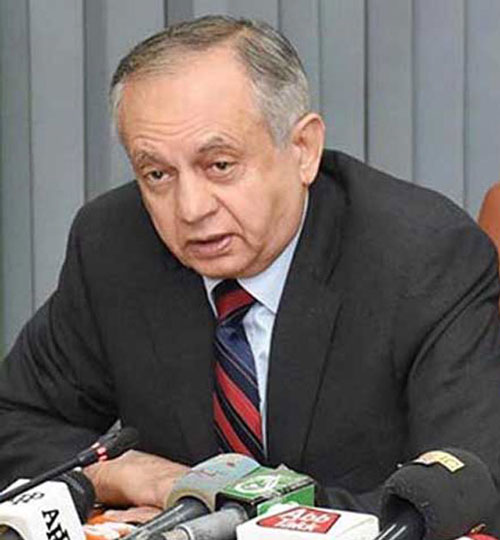Lahore
Prime Minister’s Adviser on Commerce & Investment Abdul Razak Dawood said on Saturday that viable policies of the government had improved considerably country’s export diversification during the last three years, which is the only way to enhance export revenues.
In a meeting with the business community here at the Lahore Chamber of Commerce and Industry (LCCI), he said that market and product diversification is the best way to increase exports.
“Our export of traditional items to non-traditional markets has increased 60 per cent while export of non-traditional exports to non-traditional markets has gone up by 77 per cent during the last three years,” he added.
The PM adviser said the government was going to introduce DLTL (Drawbacks in local taxes and levies) policy in which extra incentives would be given on the exports of non-traditional products.
The government is also going to sign TIR (Truckers Interchange Receipt) convention with Afghanistan for free movement of trucks to Central Asian States and other parts of the region.
He said that the government was targeting Central Asian Region to boost national exports. The government is also going to implement ‘Look Africa Policy’ and an official delegation would visit Nigeria the next month.
Abdul Razak Dawood said that the Temporary Economic Refinance Facility (TERF) of the State Bank of Pakistan, which expired in March, would be restored for SMEs and other targeted sectors.
The adviser said that the engineering and iron and steel sectors would be next area of focus for tariff rationalisation.
To a question, he said that International Monetary Fund (IMF) was the major hurdle for sales tax rate reduction. He said it was demand of the IMF that Regulatory Duty should be imposed on everything.
“As far as the matters pertaining to GSP-Plus Status and Basmati Rice are concerned, the things are well under control,” he said and added that though there were challenges, those were far less than the past three years.
He said that the import cost was increased due to inflation at international level. Oil imports have been increased in term of value.
He said that the Lahore Chamber would be given representation in Export Development Fund Board.
LCCI President Mian Nauman Kabir, Senior Vice President Mian Rehman Aziz Chan and Vice President Haris Ateeq, FPCCI (Federation of Pakistan Chambers of Commerce and Industry) President Nasir Hayat Magoon, former FPCCI president Mian Anjum Nisar, former LCCI presidents Sheikh Muhammad Asif, Shahzad Ali Malik, Irfan Iqbal Sheikh and Executive Committee Members also presented their viewpoint at the meeting.
Mian Nauman Kabir said that Lahore Chamber had always advocated the effective utilisation of Export Development Fund (EDF) in consultation with the important stakeholders of the economy.
However, the LCCI had not been given representation in the EDF Board. Considering the importance of the LCCI, it should be given adequate representation in the EDF Board.
He said that the issue of a steep rise in trade deficit needs urgent attention of the government. “In the short-term, we would urge the government to immediately implement currency swap with China from where our imports amount to around US$13 billion,” he suggested.
Mian Nauman Kabir proposed that for curtailing trade deficit, the customs duties and regulatory duties on luxury and non-essential items should be increased.
Mian Nauman Kabir said that the facility of duty drawback on local taxes and levies (DL/TL) for the exporters would not be curtailed but further enhanced in the value added sectors.










